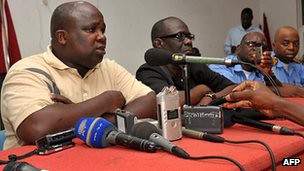
Leaders of the military coup in Guinea-Bissau dressed in civilian clothes. The leaders of the junta say they have an agreement with opposition parties for a two year transition to civilian rule., a photo by Pan-African News Wire File Photos on Flickr.
19 April 2012
Last updated at 19:22 ET
Guinea-Bissau: World community condemns transition
Junta spokesman Lt-Col Daba Na Walna said its pact was signed with several opposition parties
Union of West African states Ecowas, the African Union and other powers have condemned an "illegal" deal to transfer power in Guinea-Bissau.
The AU's Jean Ping said the agreement was a vain attempt to legitimise last week's military coup and demanded the restoration of constitutional order.
Meanwhile the World Bank and African Development Bank suspended millions of dollars in aid to Guinea-Bissau.
The junta has said it will hold elections in two years.
The West African nation has already been suspended from membership of the African Union until constitutional order is restored.
Guinea-Bissau, which has a long history of military take-overs since independence from Portugal in 1974, is one of the world's poorest countries - with almost 70% of people living in poverty and it is heavily dependent on foreign assistance.
Opposition accord
Earlier this week, mediators Ecowas held talks with the soldiers and said they had agreed to return the country to civilian rule, but no time frame was given.
The organisation recently intervened in Mali, imposing sanctions which forced the coup leaders - within weeks of last month's putsch - to hand over power to an interim president who must organise elections within 40 days.
Wednesday's accord in Guinea-Bissau outlining the transition period was signed with some opposition parties - but not with the country's PAIGC party, which has dominated politics since independence.
It confirms the dissolution of parliament and the creation of a National Transitional Council which will name an interim president and government.
Soldiers say they toppled the government over its alleged plans to reduce the size of the army.
The country's leaders, interim President Raimundo Pereira and Prime Minister Carlos Gomes Junior, were arrested during last week's coup.
Mr Gomes was the only candidate in the second round of presidential elections scheduled for 29 April, called after the death in January of President Malam Bacai Sanha following a long illness.
Opposition candidate Kumba Yala pulled out of the poll, claiming fraud.
No elected leader in nearly 40 years of independence has finished their time in office in Guinea-Bissau, which has now become a major staging post for gangs smuggling cocaine from Latin America to Europe.
No comments:
Post a Comment